In Japanese, a "salaryman" is a white collar office worker employed in any stable corporate slave job; it isn't a specific profession, but more like a pencil-pusher in a desk job kinda thing, typically seen wearing suit, tie, and suitcase. It's katakanized sarariiman サラリーマン, also romanized sararīman.
Sometimes, it's abbreviated to riiman リーマン.
In manga and anime, a salaryman is archetypically a typical, common, average, generic Japanese adult man, who tends to have a non-confrontational personality—non-adventurous, weak-willed and servile, a pushover—often working overtime to the death at some exploitative company, and conforming strictly to the formalities of an extremely vertical organizational hierarchy by respecting the authority of his superiors.
Anime: Inuyashiki いぬやしき (Episode 1)
Meaning
There are two ways the term salaryman is used: in the literal way, and in the typical way, but before we talk about that, it's important to note that salaryman isn't an English word.
Nobody uses "salaryman" in English, because it's a Japanese word that happens to be made out of an English phrase, this is called a wasei-eigo 和製英語, specifically, we're talking about sararii-man サラリーマン, which is a katakanization of the English phrase "salary man."
In the literal way, any man who receives a salary is a salaryman in Japanese.
- kyuuryou
給料
Salary. A fixed amount of money paid for a fixed amount of hours worked at fixed intervals, e.g. weekly salary for 40 hours of work, working 5 days a week, 8 hours per day.
- kyuuryou-otoko
給料男
"Salary man" in Japanese. Not an actual term, but you may see it in wordplay.
- kyuuryou-otoko
In this sense, a salaryman is someone who sells their time for a company in return for compensation. Some things that wouldn't fit this definition include:
- kabu
株
Stocks. Shares. (people whose income comes from stocks aren't salaryman.) - jiyuugyou
自由業
Self-employment. (if you work for yourself, your salary and work hours are also determined by yourself, so it's a pretty different thing.)- furii
フリー
Free. - furiiransaa
フリーランサー
Freelancer. Someone who sells their work for companies without having a full-time job contract with them. The freelancer has more independence and "freedom" than the salaryman shackled to the company, but on the other hand their income depends on their ability to find clients, and as such they need to have administrative and marketing skills on top of their own craft skills.
- furii
- mizu-shoubai
水商売
"Water business." An occupation in which income depends on one's popularity, and as such is unstable, typically referring to nighttime businesses, hostesses in a kyabakura キャバクラ, "hostess bar." - mushoku da
無職だ
To be unemployed. To not have a job or occupation.- niito
NEET(ニート)
Not in Education, Employment, or Training.
Someone who isn't learning a craft and isn't working a craft, in other words, someone who is doing nothing to contribute to society. Typically doesn't refer to people who have retired, more like young adults who graduated but aren't in the workforce.- eriito niito
エリートニート
Elite NEET. A NEET that's somehow "elite," as in coming from a rich family, or having worked in a high-paying job and quitting the company to become a NEET.
- eriito niito
- shuushoku suru
就職する
To look for a job.- shuushoku katsudou
就職活動
Job-hunting activity. The act of searching for a job. - shuukatsu
就活
- shuushoku katsudou
- niito
- sengyou shufu
専業主夫
Househusband. Who stays at home while his wife works the job that pays the bills.
With exceptions such as the above, basically everyone would be a salaryman: from salaried cashiers at convenience stores, to salaried doctors at hospitals, to salaried CEOs and the president of a nation, who also receives a salary.
There's also no age limit. You could become a salaryman after graduating from middle school so long as you get a a salaried job.
Clearly this is too broad of a definition compared to what comes up when you search for "salaryman" on the internet. The way the term is typically used in practice doesn't mean just a man who receives a salary.
- boku wa Raion
僕はライオン
I'm Lion. - goku futsuu no sarariiman desu
ごく普通のサラリーマンです
[I'm] a very ordinary salaryman. - gyaa' raion kowaiiiaaaaa
ギャーッライオン怖いいいあああああ
*shriek* a lion, scaryyyyyyaaahhh.
In the typical way, a salaryman is a man employed in a corporate office job, partaking in the often soul-killing and occasionally also body-killing corporate culture, dealing with petty office politics, harassment from one's superiors, obnoxious and incompetent coworkers, all for that sweet stable income.
- kaisha
会社
Company. (in which we work.)- Not to be confused with the semordnilap:
- shakai
社会
Society. (in which we live.) - Or with nakama 仲間 and aite 相手, which may mean "companion" sometimes.
- shakaijin
社会人
"Society person." (literally.)
A full-fledged member of the society. An adult who works some job to contribute to society. - kaishain
会社員
Company member. Company employee.
Once again, it isn't a specific occupation, but a broad term for various sorts of desk jobs and clerical jobs done in private companies, including managers, secretaries, sales strategists, bookkeepers, and all sorts of administrative and business-related office work.
- jimusho
事務所
Office (place). - jimuin
事務員
Office member. Staff.
One could translate salaryman to English as:
- Pencil-pushers.
- Desk jobs.
- White-collar jobs.
- Corporate drones.
And so on.
Typically, it involves dealing with potential business clients over the phone or in person, and filling forms and documents by hand or in computer, making copies of them, faxing them or sending them by email, etc. That's vaguely what's common about salaryman jobs.
This is why the common image of a salaryman is a man in a business suit with a suitcase full of business documents. It doesn't really matter if he's selling kitchen knives to housewives or making deals for international projects, so long as he's doing so for a company he's a salaryman.
Problematically, this usage typically excludes a very similar type of job:
- koumuin
公務員
Government employee. Public worker. Civil servant.- chihou-koumuin
地方公務員
Regional civil servant. City civil servant. - kokka koumuin
国家公務員
National civil servant. Federal civil servant, if Japan was a federation.
- chihou-koumuin
There are various types of koumuin: public-school teachers, police officers, firemen, etc., but these have nothing to do with salaryman.
The type we're talking about wear business suits, they're the ones doing administrative jobs in government offices, dealing with bureaucracy, helping the random citizen navigate through the government forms and facilities required to interact with the government, and so on.
This sort of koumuin isn't called a salaryman despite its striking resemblance with the salaryman.
Middle: Yamagami Lucy Kimiko Akie Airi Shiori Rin'ne Yoshiho Chihoko Ayano Fumika Chitose Sanae Mikiko Ichika Yukino Reina Eri Ai Tamiko Chikage Emilia Julia Shizue Erina Chisa Yumeka Natsuki Ranran Rieko Setsuri Chikako Azumi... (rest abbreviated)
山神ルーシー貴美子明江愛里史織倫弥由保知帆子彩乃冨美佳千歳早苗美紀子壱花由紀乃麗奈恵利亜衣多美子千景エミリア樹理亜志津江絵里那千紗夢佳夏希蘭々理恵子刹里智香子あずみ・・・(以下略)
Right: Hasebe Yutaka 長谷部豊
Anime: Servant x Service, サーバント×サービス (Episode 1)
- Context: there isn't a single salaryman in this picture, just chihou-koumuin.
- suutsu
スーツ
Suit. (like the one you wear.) - nekutai
ネクタイ
Necktie.
Although this is sort of pedantic, there's a fundamental difference between the average salaryman and any public worker. A salaryman works for a private enterprise, which in Japanese is confusingly termed:
- minkan-kigyou
民間企業
"Civil enterprise." As in owned by a "civilian," minkanjin 民間人.
Private enterprise.
A private enterprise is an investment that exists to provide profit for its stockholders. A capitalist invests money to hire employees to get an enterprise running to make more money. As with all investments, sometimes they don't go as planned, and there's no profit, which means employees get fired.
- kubi ni naru
クビになる
To become a head. (literally.)
To have one's head cut. To be decapitated. (execution method.)
To be fired from one's job.- kubi
首
Neck. (normally.)
Head. (in some cases.)
- kubi
This can happen for multiple reasons.
- tousan
倒産
Bankruptcy. - risutora
リストラ
- risutorakuchuaringu
リストラクチュアリング
"Restructuring." When a company makes changes to its structure in order to become more profitable. These changes may involve firing a lot of people, hiring a lot of new people, changing management, policies, etc.
- risutorakuchuaringu
A salaryman can always lose his job for a reason such as the above, but it's unlikely for the same thing to happen to a public employee, simply because it's unlikely for a government to go bankrupt and start firing everybody.
In this sense, public employees enjoy a job stability that salaryman do not have.
- {antei shita} shigoto
安定した仕事
A job [that] {was stabilized}.
A stable job.
Typically, public employees receive consistent wage increases based on the amount of years they've worked for the government. If you stick to the job, it's certain you'll receive a salary higher than what you started with.
In private enterprises, this doesn't necessarily happen, but it's relatively easier to earn promotions and bonuses based on your abilities and what results you're capable of delivering, regardless of how long you've worked for the company.
Both sorts of occupations have merits and demerits that attract different sorts of people.
In the end, however, the things you can call salaryman and those you can't just seem kind of arbitrary and vague all around.
Female
A female salaryman is called:
- oo-eru
OL (オーエル) - ofisu redhii
オフィスレディー
Office lady.
Left salaryman: Nifuji Hirotaka 二藤宏高
Right OL: Momose Narumi 桃瀬成海
Rightmost OL: Koyanagi Hanako 小柳花子
Anime: Wotaku ni Koi wa Muzukashii ヲタクに恋は難しい (Episode 1)
When the term salaryman started being used, it wasn't normal for women to have office jobs, so anyone with a salaryman job would have to be also a man.
When women started getting office jobs, other terms started being used to refer to them specifically, like BG, which's short for business girl, and even salary girl. However, OL was the term that stuck. if a woman has the same job a salaryman would have, they're said to be an OL.
See the article about OL for details.
In the western world, similar stuff happened, with people normally associating a woman working in an office job with a very specific profession:
- hisho
秘書
Secretary.
Not all secretaries are women, but there's a sexist stereotype that a secretary would be a woman, and if a woman works in an office, she'd probably be a secretary, so, effectively, "secretary" becomes kind of synonymous with "office lady" in certain cases.
In particular, tropes, jokes and fetishism surrounding "hot secretaries" in English end up translating to OL in Japanese and vice-versa.
Series that feature both men and women in a workplace tend to develop into romance:
- sha-nai ren'ai
社内恋愛
Romance inside a company.- shanai ren'ai kinshi
社内恋愛禁止
Romance inside the company [is] forbidden. Isn't allowed.
Some companies have in place policies forbidding employees to have romantic relationships with other employees, to avoid the development of all sorts of non-profitable situations in the workplace.
- shanai ren'ai kinshi
- shokuba ren'ai
職場恋愛
Romance at workplace.
Right: Retsuko 烈子
Anime: Aggressive Retsuko, アグレッシブ烈子 (2016) (Episode 32)
- Context: a kemono salaryman uses a kabedon 壁ドン on an OL, causing her to visibly panic.
You'll also see terms like these thrown around in such series:
- seku-hara
セクハラ - sekusharu harasumento
セクシャルハラスメント
Sexual harassment. - uttaeru
訴える
To sue [someone]. To take [someone] to court.
Tropes
In manga, anime, and other fiction, the salaryman is typically involved in various tropes that are derived from Japanese work culture. For reference, I'll list them here.
Superiors and Inferiors
Traditionally, Japanese society has had a strongly vertical hierarchy, and although many aspects of it are thought of as archaic in modern Japan, it's still a very relevant concept, specially inside companies and when doing business with people.
- jouge shakai
上下社会
Vertical society. - jouge
上下
Up and down. Vertical. - ue
上
Up. Above.
The top of something.
One's superiors.
- me-ue
目上
"Eye above." One's superiors, someone you look up at. - joushi
上司
Superior (in an organization). One's boss, manager, chief, etc.
- me-ue
- shita
下
Below. Under.
The bottom of something.
One's inferiors.- me-shita
目下
"Eye below." One's inferior, someone you look down at. - buka
部下
Inferior (in an organization). One's subordinate.
- me-shita
Your boss is obviously your superior. Everyone says that. But nobody says, in English, that the people "under" a boss are the "inferiors" of the boss. At best you say "underling." Normally you'd say "subordinate," which is literally below (sub) in order, in rank.
Regardless of word, your boss being "above" you logically makes you "under" them, just like servants to their masters, retainers to their lords, dogs to their owners, and so on.
- gekokujou
下克上
Inferiors supplanting superiors.
Refers to situations in which someone with less power revolts against someone with greater power.
Also refers to a type of seme/uke relationship in which the uke is superior to, and typically has authority over, the seme, which is opposite from the norm.
Although not that extreme in practice, there are some shenanigans that are observed when people of different social positions interact, which we'll see a bit more in detail later.
Note that one's boss being above someone doesn't mean they're above everyone, after all:
- ue niwa ue ga aru
上には上がある
To "up," there's "up." (literally.)
To someone who's above [you], there's someone who's above [them].
There's always a bigger fish, i.e. to a fish bigger than this, there's a fish bigger than it. - chuukan kanri-shoku
中間管理職
Middle management job. Someone's a manager, above some employees, but who themselves have a manager, i.e. to your manager, there's a manager.
- Context: someone that doesn't seem qualified to be a salaryman joins a company, bewildering other employees.
- motto ue no kata de wake ari no jinbutsu kamoshiren zo Imai-kun......
もっと上の方でワケありの人物かもしれんぞ今井君・・・・・・
Imai-kun, it could be that [he's] a person [connected] to someone more above.- wake ga aru
訳がある
To have some circumstances, reasons. In this case, that something must have gone on between someone "move above" and the new employee, so he has a connection with them somehow. - ~kun
~君
Honorific used toward subordinates, a teacher's students, and boys.
- wake ga aru
- motto ue tte shachou...... iya, kaichou...
もっと上って社長・・・・・・いや 会長・・・
"More above," [that means] the company president...... no, the chairman...
Seniors and Juniors
Besides one's position in a company's hierarchy, another type of vertical hierarchy is the one by seniority, which is how long someone has been working in that company.
- senpai
先輩
Senior, who came "before" you, saki 先. - kouhai
後輩
Junior, who came "after" you, ato 後. - douhai
同輩
Colleague who came at the "same" time as you, onaji 同じ.- douryou
同僚
Coworker, regardless of seniority. - sarariiman doushi
サラリーマン同士
Both salaryman. (as in, "we're both salaryman, so let's solve this amicably," etc.)
- douryou
You've probably heard of some of the words above in school anime, where ages are neatly arranged, and everything works fine, but companies aren't schools, so confusion tends to arise.
Everyone joins school at around the same age, so your senpai at school is likely older than you.
If you joined a company young, and stayed in that company forever, and everyone did the same, then organizational seniority and physical age seniority would match perfectly, just like schools, but that doesn't always happen.
Sometimes someone is fired from a company or the company bankrupts, etc., and they have to join a different company, in which they are a new hire, so they'll logically be the junior-est junior in the entire company, and everyone would be their senpai, just like Mash.
In that case, even a teenager who joined that comment a month before would be their "senior" in the company.
- yoroshiku onegaishimasu, Kageyama-senpai.
よろしくお願いします影山先輩。
[Take care of me,] Kageyama-senpai.- Expression used when meeting someone, or entering care or supervision of someone else, in this case, their senpai.
- e?
え?
Eh? - a... yoroshiku onegaishimasu...
あ・・・よろしくお願いします - kinchoo shitekita...
キンチョーしてきた・・・
[Now I feel] nervous...
- Relaxed pronunciation of:
- kinchou
緊張
Nervous. Anxious. Tense. - In this case, because he's now burdened with the responsibility of having a kouhai.
This is sometimes a plot point in office-related stories: when someone has a senior who's younger than them, the hierarchy gets murky: who is above whom? The kouhai may think he should be respected by age, but the senpai may believe he must be respected by his longer time in the company.
- toshi
年
Age. (of a person.) - toshiue
年上
"Age-above." Someone who's older than you.- {toshiue no} kouhai
年上の後輩
A junior [who] [is older}.
- {toshiue no} kouhai
- toshishita
年下
"Age-below." Someone who's younger than you.- {toshishita no} senpai
年下の先輩
A senior [who] {is younger}.
- {toshishita no} senpai
You can also end up in a situation where someone's manager is younger than they are, sometimes for the right reasons sometimes not, they could they simply have the skills for the job, or they only have that position because they're a relative of the company president, i.e. nepotism.
- {toshishita no} joushi
年下の上司
A superior [who] {is younger}. - namaiki da
生意気だ
To be cocky, cheeky, impudent. (used by older characters toward younger characters who disregard what they say.)
Terms for Boss, Manager, Chief, Etc.
For reference, terms for the typical hierarchy of a company, ordered from top to bottom[会社の役職順位一覧 専務常務はどっちが偉い?次長と課長は? - iroiro-kininaru.com, accessed 2020-12-11]:
- kaichou
会長
Chairman. The leader of an "association," kai 会. In a company, the highest in the hierarchy, although it's generally a ceremonial position and the person that actually gets stuff done is the company president.- ~chou
~長
Leader. Chief. President. Boss.- taichou
隊長
Command officer, leader of a company of troops, a squad, an unit (military sense), etc. - kougeki-tai
攻撃隊
Attack forces. Attack unit. Attack squad.
- taichou
- kaisha no toppu
会社のトップ
[The person in] the top [position] of a company. - Not to be confused with:
- saikou keiei sekinin-sha
最高経営責任者
"Highest responsible for an operation." (literally.)
Chief executive officer. CEO. - The term CEO isn't used very often in Japanese companies, compared to American companies.
- Also, the CEO reports to a board of directors, which would put them hierarchically under the board members in a company, and certainly not a the top of the company.
- ~chou
- shachou
社長
Company president. The leader of a company.- shachou-ken-shii-ii-oo
社長兼CEO (シー・イー・オー)
Company president and CEO.
- shachou-ken-shii-ii-oo
- fuku-shachou
副社長
"Auxiliary company president." Executive vice-president. - senmu-torishimari-yaku
専務取締役
"Special-duty" managing director. Senior managing director. Executive managing director.
Aids the company president in special matters. - joumu-torishimari-yaku
常務取締役
"Normal-duty" managing director.
Manages the normal company activity. - torishimari-yaku
取締役
Board member. Company director.- tori-shimaru
取り締まる
"To grab and tighter." (compound verb.)
To control. To manage. To command. - ~yaku
~役
Role. E.g. "the role of directing a company" means company director. - torishimari-yaku-kai
取締役会
Board of directors. "Association of people in the role of directing a company."- This is the association which the kai-chou of a company is leader of.
- tori-shimaru
- honbuchou
本部長
General manager. Chief of the:- honbu
本部
Headquarters. "Main department."
- honbu
- buchou
部長
Chief of a department.- Note: department, division, section, subsection, etc. are translations used interchangeably and often inconsistently with the terms for parts of a company below.[事業部、部、課は英語だと、Division、Department、Sectionのどれなのか教えて! - ネイティブイングリッシュ.biz, accessed 2020-12-11]
- henshuu-bu
編集部
Editorial department. - soumu-bu
総務部
General affairs department. - keiri-bu
経理部
Accounting department. - jinji-bu
人事部
Human resources department. HR. - kouhou-bu
広報部
Public relations department. - kenkyuu-bu
研究部
Research department. (the R of R&D.) - kaihatsu-bu
開発部
Development department. (the D of R&D.) - shizai-bu
資材部
"Materials" department. (as in the procurement of.)
Procurement department. - kikaku-bu
企画部
Planning department. - The full job title for the chief of any such department would get bu 部 twice, e.g.:
- soumu-bu-buchou
総務部部長
The department-chief of the general-affairs-department.
- soumu-bu-buchou
- Note: bu 部 also means "club," like of a school.
- yakyuu-bu
野球部
Baseball club. - bukatsu
部活
Club activities.
- yakyuu-bu
- ji-chou
次長
Vice-chief.- ji~
次~
Next. (e.g. next in command.)- ji-nan
次男
Second-born son. The son born next after the first one.
- ji-nan
- ji~
- kachou
課長
Chief of a section.- Note: again, the translation doesn't matter, but ka 課 is smaller than bu 部, so as far as this article is concerned a company is divided into departments (bu 部) that are further divided into sections (ka 課).
- You can replace basically any "department" term for a "section" term. That depends merely on how the company is structured.
- soumu-ka
総務課
General affairs section.- soumu-ka-kachou
総務課課長
Section-chief of the general-affairs-section.
- soumu-ka-kachou
- kigaku-ka
企画課
Planning section.
- kakari-chou
係長
Subsection manager.
- Note: ~kakari ~係, or ~gakari(rendaku 連濁), also means a task that someone is in charge of.
- uketsuke
受付
Reception. - uketsuke-gakari
受付係
The reception task, or the person in charge of it.
Receptionist.
- uketsuke
- Note: ~kakari ~係, or ~gakari(rendaku 連濁), also means a task that someone is in charge of.
- shunin
主任
Chief [of a group]. A leader-like title given to an employee who has been in a company for a few years or so so they're the person with most responsibility in a group. Not really a managerial position, just a title, but may come with a bonus May make them the representative between a group of employees and their manager. - ippan shain
一般社員
"General company-member." General employee. I.e., the rest.
Notably, Shima Kousaku 島耕作 is the salaryman protagonist of a decades-long manga series that's divided in multiple parts as he climbs the corporate ladder[dates from Kosaku Shima - wikipedia.org, accessed 2020-12-24]:
- 1983–1992: kachou.
- 1992–2002: buchou.
- 2002–2005: torishimariyaku.
- 2005–2006: joumu.
- 2006–2008: senmu.
- 2008–2013: shachou.
- 2013–2019: kaichou.
- 2019-present: soudan-yaku 相談役, "consultant."
Business Language
A salaryman character tends to speak in a peculiar way compared to other characters, that's because, in Japanese, there's a way of speaking that's used toward one's superiors, and one that's not. They are:
- keigo
敬語
Polite language, which includes desu です, ~masu ~ます. - tameguchi
タメ口
Casual speech, which excludes desu and ~masu..
Of course, the situation is actually more complicated than that.
First off, there are a few different types of keigo, used in different sorts of situations.There are polite expressions that are used by servants toward their masters, but these are more common in maid and butler characters, or when an emperor or king character is involved, not salaryman stuff.
Second, keigo isn't only used toward one's superiors, it can also be used toward one's equals.
Generally speaking, keigo is a stiff way of speaking, it's morphologically longer, and may require you to be mindful of your choice of words, so some people would rather just not use it because it's a hassle, and only use it when it's necessary.
In particular, being close, familiar with someone, friends with them, may be reason enough to use tameguchi, but it depends on various factors.
In a casual context, it's assumed everyone would rather speak in tameguchi. If someone speaks in keigo, they would be speaking respectfully toward you, but you're speaking casually toward them, and you feel forced to speak respectfully, too, but you don't wanna, which is just awkward altogether.
With fiction, if a character speaks in keigo when it's not required, that typically means they're so used to speaking that way, it's just their default now and it's harder for them to speak in tameguchi.
For example, a character who was raised in a rich, traditional family, or a salaryman who speaks most of his time speaking in keigo, so he got used to it.
Most importantly is what happens when a character doesn't speak in keigo.
A subordinate who uses tameguchi toward their superiors is often at risk of being reprimanded, or just disliked in the company.
There's the question about which one to use toward a senior or superior who is younger than you in age.
Should a superior use keigo toward their subordinates? This is a tricky one. By not using keigo but demanding the subordinate to use it, there's an obvious "you speak respectfully to me, but not vice-versa" idea being asserted. The hierarchy is being reinforced.
Now, some people don't think that's nice, since it's like your manager doesn't think of you as their equal, but as someone inferior and not deserving of keigo, however, since the society is vertical, some people view that as being literally the case, and as such they feel it's justified.
For example, words like kimi 君, "you," sound condescending and may be avoided toward one's equals, but a manager may feel like they can just talk like that to their subordinates and juniors, simply because they are, in fact, "superior" to those people.
There are also external cases: when dealing with clients, be it business clients or event a customer in a convenient store, employees are generally supposed to keigo, not tameguchi, as that's just the basic manners about attending to customers and making business deals.
Of course, the same isn't actually demanded for the customer or client.
As such, the language used can indicate the power balance, the hierarchy between two characters, if a character considers themselves inferior to another or not, if they feel they have to speak respectfully or not, or if they simply don't know how to speak non-respectfully, perhaps because they're used to being low in the hierarchy, perhaps because they're just polite in general.
Weak-Willed
It's a trope that a salaryman is a weak-willed pushover, who's submissive to the orders of his superiors in a company, and just bends under pressure in general, even outside the company.
This stems mostly from salaryman jobs being stable jobs, safe income without much risk, as opposed to an adventurous job or something riskier. The salaryman isn't a risk-taker, and therefore he isn't confrontational either: running from fights and avoiding making enemies.
Anime: JoJo no Kimyou na Bouken ジョジョの奇妙な冒険 - Part 4: Diamond is Unbreakable (Episode 21)
- Context: My name is Kira Yoshikage. I'm 33 years old. My house is in the northeast section of Morioh, where all the villas are, and I am not married. I work as an employee for the Kame Yu department stores, and I get home every day by 8 PM at the latest. I don't smoke, but I occasionally drink. I'm in bed by 11 PM, and make sure I get eight hours of sleep, no matter what. After having a glass of warm milk and doing about twenty minutes of stretches before going to bed, I usually have no problems sleeping until morning. Just like a baby, I wake up without any fatigue or stress in the morning. I was told there were no issues at my last check-up. I'm trying to explain that I'm a person who wishes to live a very quiet life. I take care not to trouble myself with any enemies, like winning and losing, that would cause me to lose sleep at night. That is how I deal with society, and I know that is what brings me happiness. Although, if I were to fight I wouldn't lose to anyone.
Easy Target
The salaryman is a common target for petty gangs of robbers and harassers, who are often younger and stronger than the salaryman. There are various reasons for this.
First, it's a trope that evildoers target the common man, who's represented here by the salaryman.
Second, desk jobs don't require a lot of physical strength, so, muscle-wise, the salaryman is going to be weaker individually than someone whose job is moving stuff heavier than documents around.
Third, the submissive nature of the salaryman, plus the fact they may have a good-paying job and fat wallet, means he'd quickly surrender his wages to any gang of hoodlums that were to threaten him.
Fourth, in the unlikely even that he actually fought back, he'd come back to the company in bruises, or would end up in jail, or anything of sort that would cause trouble for the company and possibly get him fired, so he's screwed either way.
Cold Sweat Dispenser
As typical in manga, when a character is anxious, nervous, under pressure, and so on, they're drawn sweating. In the case of the salaryman, they're going to be sweating a ton of liquid whenever their job is on the line, which is pretty often.
The slightest amount of pressure and risk in any negotiation is enough to make a salaryman think: "I hope I don't get fired for this."
From Bowing to Shoe-Licking
A salaryman is often depicted prostrating himself and begging to stay on his job. This sort of prostrating is kind of part of Japanese culture, but it's a bit complicated to explain.
For starters, when things go wrong, and it's somebody's mistake, fault, responsibility, etc., they're going to get fired, so there'll be a lot of apologizing going on.
- kureemu
クレーム
"Claim." A customer's complaint. - sekinin wo toru
責任を取る
To take responsibility [for something]. - moushi wake gozaimasen
申し訳ございません
[I] have no excuse. (i.e. I assume the fault entirely.)
Now, speaking generally, the gesture done to apologize or thank in Japanese culture is lowering one's head, also known as "bowing." But nevermind the bow thing, lowering the head is the important part.
- atama wo sageru
頭を下げる
"To lower the head." To bow.
The lower the head goes the deeper the apology or gratitude is supposed to be.
Normally, this stops at a simple bow. If you want to apologize or thank someone, you just bow. However, bowing is also used to greet people in Japan. So there's at least two bows. But one bow isn't a bow-y as the other bow. There's different levels of bowiness going on here.
.As far as terminology is concerned[お辞儀の深さはどう使い分ける? - co-medical.mynavi.jp]:
- eshaku
会釈
Meeting bow. A 15 degree bow used to greet people. - keirei
敬礼
"Respectful salutation." A 30 degree bow used to greet someone for the first time.- ojigi
お辞儀
Bowing (gesture), typically refers to this.
- ojigi
- saikeirei
最敬礼
Utmost respectful salutation. A 45 to 90 degree bow used to apologize or thank people.
Naturally, you won't be bowing harder than 90 degrees, lest you plant your face into the floor like an ostrich—except ostriches don't actually bury their heads into the sand, that's a myth, but I digress—so after 90 degrees you gotta lower yourself some other way.
That other way is by kneeling, of course, and then by planting your face into the floor, like an ostrich. This is called:
- dogeza
土下座
A type of prostration. - kono toori desu
この通りです
"[It] is this way." As you can see. Phrase used by someone prostrating themselves, to call attention to the fact that this is how far they're willing to go for the thing in question.
The infamous pose has been perfected to an art by the Japanese, or at least that's what the countless jokes about dogeza would lead you to think. It's basically a meme.
You can find information on how to do the dogeza properly, the proper form, pose, etc., variations of dogeza, sliding dogeza, all that sort of stuff.
- Context: an ad for Nihongo Gokan no Jiten 日本語語感の辞典, "Japanese nuance dictionary," depicting various apologetic gestures, the last (leftmost) one being the dogeza. The text aren't terms for the gestures, but words related to apology.
- ayamaru
【謝る】あやまる
To apologize. (title of the ad.) - shitsurei
失礼
Excuse me. Pardon. Said when doing something that "lacks respect," literally, hence why you excuse yourself. - gomen
御免
Forgive me. Sorry. - sumanai
済まない
Sorry. Literally in the sense of something done that "won't disappear," so it's a regrettable mistake or gratitude that won't be forgotten, but in practice it's used for all sorts of minor stuff. - moushi wake nai
申し訳ない
[I] have no excuse. (nai, arimasen, gozaimasen, mean the same thing.) - chinsha
陳謝
To explain yourself and apologize. Used when not only you're at fault, but you also have some explaining to do, e.g. to explain to a client why things have gone wrong, and apologize to them for things going wrong. - shazai
謝罪
Apology, in the sense of assuming fault, "crime," "sin," tsumi 罪.
According to Araragi Koyomi 阿良々木暦, there's a level of lowering your head beyond the dogeza, which is doing a handstand. There are other examples of ultra-dogeza apologies found in anime and jokes, like literally burying your head into the ground.
This image that a salaryman has to apologize to clients, apologize to his boss, apologize to everyone, kind of makes him some sort of pathetic pushover who can't stand his ground. Obviously this isn't true in real life, but many series satirize based on this idea.
- Context: Saiki Kuniharu 斉木國春 literally begs for his job back.
- onegai shimasu! mou ichido koko de hatarakasete kudasai!!
お願いします!もう一度ここで働かせて下さい!!
Please! Let [me] work here again! - nanda omae, {kutsu nameru} no heta ni natta naa
何だお前 靴舐めるの下手になったなぁ
[What's up with] you, [you suck at] {licking shoes} [now], uh.
- nanda omae - emotive right-dislocation.
- omae wa nanda?
お前何だ
You are what? (literally.)
What's up with you? What happened to you?
- omae wa nanda?
- heta ni naru
下手になる
To become unskilled.
To become worse at doing something.
To suck at doing something now.
- nanda omae - emotive right-dislocation.
- maruku osamatte yokatta ne~~
丸く収まってよかったね~
[Good thing] [it] ended up well, huh~- marui
丸い
Round. (literally.)
Ending without trouble. Ending well. - osamaru
収まる
To be contained. To fit in.
For an issue to be settled. - ~te yokatta
~て良かった
I'm glad that...
It's a good thing that...
- marui
Exploitation
A salaryman is often overworked or plain miserable in his job. There are various reasons for this, but it basically boils down to the shoe-licking culture. Always trying to please one's boss means you'll eventually end up with an abusive boss in an abusive company that will exploit you.
- burakku kigyou
ブラック企業
"Black enterprise." An exploitative enterprise, including sweatshops, unregulated factories, that sort of thing.- burakku kaisha
ブラック会社
"Black company." (same meaning.)
- burakku kaisha
- shachiku
社畜
"Corporate [livestock]." Corporate drone. Corporate slave. Employees that are treated as nothing more than slaves by corporate, being overworked and underpaid.- kachiku
家畜
Livestock. (cows, chickens, pigs, horses, etc. farm animals.)
- kachiku
Abusive Bosses
In extreme cases, a salaryman has a boss who criminally abuses them, and I mean criminally as in it's literally a crime to do that.
Between physical forms of punishment, verbal forms of abuse, and mental forms of harassment, there are things that bosses can do to employees that will get them sued in court. This is known as:
- pawa-hara
パワハラ - pawaa harasumento
パワーハラスメント
Power harassment. Harassment done by a boss abusing their power, their authority, over their subordinates.
Of course, beating people is just wrong in general, but there are sorts of abuses that can only be performed by abusive bosses.
For example, maybe the salaryman's boss is vindictive, they just hate the salaryman, and decides to give the poor dude a task that's not supposed to be done by a single person, something too difficult, that takes too much effort, perhaps even impossible for him to do.
That could count as power harassment. I'm not a lawyer, so I don't know for sure. But this sort of thing exists.
Overtime
It's extremely common for a salaryman to do overtime. From the unhealthy work culture of "don't leave the office until your boss does" to black companies squeezing the life out of those miserable corporate slaves, the overtime of a salaryman is more like normaltime, it's simply what's expected of them.
There are several terms for overtime in Japanese.
- zangyou
残業
Overtime. (in general.) - jikan-gai roudou
時間外労働
Labor outside-time. Overtime.
Time worked over 40 hours weekly, 8 hours daily, as defined by law. - warimashi-chingin
割増賃金
Extra pay. Overtime pay.
By law, time worked over 8 hours daily must be paid at 125% rate. - shotei-jikan-gai roudou
所定時間外労働
Labor outside prescribed hours.
For example, if a company contracted you to work from 9 to 17, and you end up working until 18, that's outside the prescribed hours, even if it's inside the 8 hours day of work.
Of course, for the true salaryman, master of the art of shoe-licking, it's not enough to work overtime, you also have to work overtime for free, because why not, we must please our corporate overlords!
- saabisu zangyou
サービス残業
Free overtime. Working overtime without being paid. Also known as "wage theft."- sabi-zan
サビ残 - saabisu
サービス
"Service." (literally.)
In Japanese, something done free of charge in a business, used to make the business more attractive. From there, work done for free, and bonuses, extras given for free. The anime term fanservice also comes this, through otherwise it would mean celebrities doing stuff for free for their fans.
- sabi-zan
Death From Overwork
This article couldn't be complete without mentioning the number two cause of salaryman being reincarnated in an isekai:
- karoushi
過労死
Death from overwork.- sugiru
過ぎる
To exceed. - karou
過労
Overwork. "Exceeded labor." - shinu
死ぬ
To die.
- sugiru
Series about characters being reincarnated in another world—not transported, summoned, taking a nap and suddenly waking up in, or just randomly ending up in, etc. reincarnating, as in dying first, and then reincarnating, or getting reborn—typically follow these two starting templates:
- The main character gets hit by Truck-kun, dies, ends up in another world. Sometimes they get hit because they're trying to save someone else, and this self-sacrifice kinda becomes the excuse for "why in the world is a God reincarnating this dude, of all dudes?"
- The main character is an adult working a job in a company. A salaryman. Specifically, he's probably a programmer, or a video-game developer. Like, seriously. He has dark circles under his eyes from not sleeping enough, and then he dies from it.
Death from overwork is, obviously, a serious problem, in all sorts of ways, however, as far as anime is concerned, people only die from overwork when they're a salaryman about to get reincarnated in another world.
- Some examples include:
- In Slime Taoshite Sanbyaku-nen, Shiranai Uchi ni Level Max ni Nattemashita, スライム倒して300年、知らないうちにレベルMAXになってました, the protagonist dies from overwork and reincarnates in a fantasy world where they wish to do nothing all day.
- In Death March Kara Hajimaru Isekai Kyousoukyoku, デスマーチからはじまる異世界狂想曲, which is literally the most mindbogglingly soulless series I've ever had the misfortune of encountering, utterly lacking any semblance of spirit, of inspiration, or of will, and just disgustingly railroading the main character into event after event by connecting them with nothing more than pure and absolute coincidence, also happens to be about a character who is working overtime and just... goes to a nap and wakes up in another world, like, seriously, he doesn't actually, canonically dies from overwork, he takes a nap, A NAP, the author couldn't even commit to killing the protagonist, why, kamisama, why!!!!
- In Kami-tachi ni Hirowareta Otoko 神達に拾われた男, the main character is overworked and dies, saying he was certain that job would end up killing him, which leads one to believe he died from overwork, however, as a joke, it turns out he sneezed whiled sleeping, fell off the bed, hit his head, and died from brain hemorrhage instead.
It's unlikely for an important character in a series to just die from overwork. You may see some dark humor jokes about dying from overwork in some series, and maybe some of them die in the backstory. But just killing a character that way is unlikely..
After-Work Drinking
It's part of the Japanese work culture for a salaryman to go drink with his colleagues and/or bosses after a day of work. This is any single day, not just Fridays, we're talking about Thursdays and Mondays here, too.
- nomikai
飲み会
"Drinking meeting." "Drinking party." To meet to drink [after work].- joshikai
女子会
"Girls meeting." A no-boys allowed nomikai. - goukon
合コン
Mixer. Typically a meeting between a group of guys and a group of girls, with the intent of finding a romantic partner. Although it may look similar, this is eating and drinking, not just drinking.
- joshikai
- shigoto-gaeri ni nomi ni iku
仕事帰りに飲み行く
To go drink coming home from work. - shinboku wo fukameru tame
親睦を深めるため
In order to deepen the relationship [of work colleagues]. To deepen their friendship, etc.
If a shoe-licking salaryman does overtime for free, doesn't leave work until their boss does, and then has to accompany his boss to a nomikai after his shift is over, that means his work-life balance is more like work-work-work balance.
The salaryman's entire life ends up being about work, spending most of his time in a company, socializing mostly with the company's members, and having his life influenced by the company even outside the company.
No wonder this work culture gets criticized so much.
- Context: Wakabayashi 若林 is in love with Hige 日下, who is a guy.
- sake nomitee
酒飲みてぇ
[I] want to drink alcohol.- nomitee is a contraction of nomitai 飲みたい.
- tte wake de Wakabayashi kyou no yoru joshikai sunzo!
ってわけで若林今日の寄り女子会すんぞ!
[That's how it is, so] Wakabayashi, today's evening [we] will do a joshikai!- sunzo is a contraction of suru zo するぞ.
- Hige-san wa kuru-n-su ka?
ヒゲさんは来るんすか?
Will Hige-san come?- kuru-n-su ka is a contraction of kuru no desu ka 来るのですか.
- Wakabayashi contracts desu and masu to su, ssu. This is sometimes said to be a half-hearted type of keigo.
- joshikai da
女子会だ
It's a joshikai.- A "girls meeting" for drinking, and Hige is a guy.
- tte koto wa kuru-n-su ka?
ってことは来るんすか?
[Which means] [he] will come? - konee yo
来ねぇよ
[He] won't come!- konee is a contraction of konai 来ない.
- san-nin de yoyaku tottoku zo~
3人で予約とっとくぞー
[I] will make a reservation for three people~.- tottoku is a contraction of totte-oku とっておく.
- ussu
うっす
[Alright]. - izakaya
居酒屋
(a sort of Japanese bar-restaurant serving drinks, food, and snacks.) - hoppu steppu yokochou
ホップステップ横丁
Hop Step Alley. - doushita Wakabayashi! genki nai jan nome nome!
どうした若林!元気ないじゃん飲め飲め!
[What's wrong] Wakabayashi! [You're so quiet], drink drink!- genki 元気 is lively, energetic, so genki nai is the opposite: seeming down, being quiet, etc.
- nonderu ssu yo
飲んでるっすよ
[I] am drinking.
- Same as nonde-imasu yo 飲んでいますよ.
- okonna yoo
怒んなよー
Don't get angry~- Contraction of okoru na 起こるな.
- kondo mata Hige mo yobeba ii daroo
今度また日下も呼べばいいだろー
Next time [we just have to] call Hige, too, right?
- yobeba ii 呼べばいい means it would be "good," better, if we "call" Hige.
- See hou ga ii 方がいい.
Party Tricks
In a nomikai sometimes someone has to do a party "trick," gei 芸. These tend to be silly, dumb stuff, and some more serious characters may just not be good at them at all.
Drunkard in Business Suit
Sometimes, you'll see a a completely drunk, disheveled salaryman walking the streets at night coming back home, with a bottle of alcohol in hand, babbling complaints about his superiors and stuff like that.
Necktie Around Head
Sometimes, you'll see a salaryman after-work-partying with his necktie wrapped around his head like a headband.
This isn't specific to Japan, by the way.
After having to wear a hot suit for long hours, be it for work or even for some other sort of ceremony, one would like to undo the necktie and party, so there's this custom of wearing it as a headband instead to look silly while having fun.
Passing Out on the Street
From the combination of being exhausted from work and drunk from beer, sometimes a salaryman will pass out on the street on his way home, and just sleep there.
Bar Fights
Although unlikely, it's possible for a salaryman to get involved in a fight in a bar, mostly because they're often in bars.
Commuting by Train
The common way for a salaryman to commute to work, as well as for students to commute to school, is by train. Japan is known for its excellent public transportation system, and for its trains, its all sorts of trains.
- ressha
列車
Railway train. Transports passengers or goods. - densha
電車
Electric train. - shinkansen
新幹線
"New main line." Known as the "bullet train" in English, this is a Japanese network of high-speed "railway lines," senro 線路.
Passing Out on the Train
Just as a salaryman may pass out on the street after a tiring day of work and drinking, they may pass out on the train on his way back home, too.
Groping Female Passengers
A common scenario involving a salaryman is the act of groping female passengers on the train. This is known as:
- chikan
痴漢
Molestation. Groping. Obscene behavior done towards a woman.
Pervert. Molester. Groper.
"Foolish man." (literally.)
The victim of a train molester can be anyone, if we were talking about any train, however, the salaryman doesn't board just any train, he commutes by train, taking the morning train to work and the evening train home, during rush hours.
As a consequence, the victims of a salaryman molester tend to be commuting, too: they're OLs or JKs, that is, "high school girls," joshi-kousei 女子高生.
In anime, they're usually high school girls, because most anime takes place in high school, so the victim is either the protagonist or a classmate of the protagonist, and the salaryman is a random background character that only exists for that one groping scene.
Regarding this there are all sorts of tropes. For example:
- If a salaryman is caught touching someone's butt, they'll probably end up in court and have to pay settlement money.
- Sometimes, a woman with ill-intentions may falsely accuse a salaryman of groping in order to get that settlement money, by the way.
- Naturally, he's going to get fired from this. His money is gone. His job is gone. His family, wife and children, are probably gone too, because he's wife is totally going to divorce him for this kind of thing.
- In other words: his life is over. Or at least that's a trope surrounding this sort of scenario.
- Context: after being falsely accused of groping, Sanematsu-san 実松さん becomes overly anxious in trains and is seen keeping his hands as far as possible for any butts.
Middle: Ootori Miou 鳳美煌
Right: Sonokawa Momoka 園川モモカ
Anime: Sabage-bu'! さばげぶっ! (Episode 1)
- Context: Momoka was being groped in the train by a random salaryman, until Miou intervened, and pointed her trusty pair of pistols, desert eagles, into his face, inside the passenger train, which resulted in the station employees arresting her instead of the groper for waving guns around.
Generic Adult Male Archetype
Sometimes, a salaryman is a salaryman because they're an adult male and that's it. It's the adult counterpart of a student. If you have a random male character that's an adult, they're a salaryman, if they aren't an adult, they're a student.
That's because the alternative is more complex.
If you have a character that's of high school age and yet isn't a high school student, that would be unusual. Not impossible, simply unusual. And unusual is interesting for the audience, so the author would be forced to elaborate that unusual thing in detail.
Why is the character not in high school? What do they do all day every day? Do they want to go to high school? And so on.
Perhaps none of this information matters to the story—what the author really wants to tell is something else entirely—so it's easier to just say they go to high school like everybody else of their age and skip that part of the character's profile.
With adults school is no longer an option. It would be unusual for someone that should have graduated already to be going to school.
It would also be unusual for them to be unemployed. Why doesn't he have a job like everyone else?
However, if you gave the character a cooler profession like calligraphist or even a more specific office profession like negative assets manager you'd be forced to make this information relevant in the story somehow to justify the fact you included such information in first place.
Since the specifics of the job don't matter, what matters is that the character has a job at all, it's easier for the author to simply say they're a salaryman so everyone can just ignore that part of their profile altogether.
Note that most series that feature student characters aren't about studying, just like most series that feature salaryman characters aren't about working in an office, but merely make use of various office-related events, like copying or emailing documents, dealing with clients, talking to bosses, etc.
- In Servant x Service, a protagonist works at one of the information counters in a government office together with a senior, but the senior notes that, although many people come by the counter, they never require the service of that specific counter, so she can't teach the protagonist what her job is supposed to be like.
By contrast, series about cool jobs are about themselves, e.g. if the series is about a demon slayer, it's about demon slaying.
Since most series have mostly high school age characters, sometimes a business suit is added to a random character to convey they're supposed be an adult as opposed to just another kid. Similarly, sometimes a long gray beard is added instead to convey they're of old age.
A character only ends up being a generic salaryman instead of a generic student if there's some reason for them to be an adult, given everything else is basically the same, which means a salaryman is only chosen if:
- It's one of those "we need an adult" situations.
- It's one of those "we can't trust adults" situations.
- The character needs to have money a student wouldn't have.
- The character needs to have life experience a student wouldn't have.
- For sexual reasons the character has to be an adult.
As for the last one, that's possibly why a train molester ends up being random salaryman in anime.
Another relevant scenario is "sugaring," papa-katsu パパ活. A practice in which an older man, called a sugar "daddy," papa パパ, pays a younger woman to date with him.
An usually criminal variant of this is called enjo-kousai 援助交際, in which the younger woman is actually a high school girl, and possibly underage. In either case the older man tends to be drawn as a salaryman because you just need a random adult man with a job for this role.
Becoming a Salaryman
Sometimes, a character who isn't a salaryman becomes one, and that's what the story is about.
Why a salaryman, specifically? Because being a salaryman is boring.
I mean, what would you rather do? Work like a slave to make some rich man richer, or play video-games all day? Alternatively, how about hanging around with your gang picking fights all across Japan instead of thinking about your future all day? That sounds pretty neat, too.
As such, you have two types of characters that are the very opposite of a salaryman:
- The NEET, who could be saying to be doing nothing with his life, not studying or learning a skill, or even working a job and earning money. Typically these are also hikikomori, locking themselves in their rooms or basements all day. And also otaku, spending all day gaming and watching anime,
- The delinquent, who hates rules and obeying authority, who doesn't even wear his school uniform right, so there's no way he would wear a business suit properly and remember all those troublesome business formalities that come with an office job.
These types become a salaryman in order to straighten their lives, in order to become a proper, functioning member of society.
Naturally, nobody is really asking for any of this, like, we live in a society, so as long you get a job, any job, society benefits, it doesn't really need to be a salaryman.
NEETs spend a lot of time in the computer so they often get portrayed as computer geniuses and hackers and that sort of stuff, so they could just get a job in that area instead.
The point of turning an useless-as-far-as-society-is-concerned character into a salaryman is the striking difference between their behavior trying to exist outside of society and its rules and them trying to adapt and fit into society.
In comedy series, sometimes characters are only temporarily made into a salaryman, or even just a salaried worker, as a joke to show them being forced to conform with rules.
The same thing tends to happen with non-adult characters who have never gone to school or conformed to rules, often for ridiculous, extraordinary reasons, except these are thrown into school instead of thrown into an office job.
Ex-Salaryman
Sometimes, a salaryman character gets sick and tired of being a salaryman and gives up on that boring, soulless, greed-serving, exploitative life in order to do something cooler and more fulfilling.
- datsu-sara
脱サラ
Ex-salaryman.
- dassuru
脱する
To escape. (the life of a salaryman.)
- dassuru
There are countless examples of this, mostly because the adult audience who are salaryman would totally relate with getting out of the profession to do something else.
In many isekai anime, the whole point of a salaryman reincarnating is leaving your boring company (and life) behind and starting a new one in a fantasy world. Every similar setting ends up also being wish-fulfillment fantasy.
This isn't exclusive of Japan or anime. Western movies like Matrix and Wanted also feature a protagonist who's a random employee in an office and gets their boring lives turned upside down when something happens.
- Context: Gojou Satoru 五条悟 introduces Nanami Kento 七海建人, who's his junior.
- datsu-sara jujutsushi no Nanami-kun deesu
脱サラ呪術師の七海君でーす
[He] is the ex-salaryman curse-technique-master Nanami-kun!
- jujutsu 呪術 means literally "curse," noroi 呪い, "technique," jutsu 術, and ~shi ~師 is a suffix that means "master," as in someone who has mastered techniques in the study of something.
- Normally jujutsushi would translate to "witch doctor" or "shaman," who use curses on people, like straw dolls, but in this series the translation "sorcerer" is also used, even though a magic sorcerer would be a majutsushi 魔術師 instead.
- sono iikata yamete kudasai
その言い方やめて下さい
Please stop with that way-of-saying. (literally.)
Please stop calling me that, introducing me like that, etc.
- Context: Saitama サイタマ isn't a even salaryman yet, he was searching for a salaryman job, doing job interviews, until he meets a monster that wants to murder children and he remembers what he really wanted to become.
- sarariiman janakute, {{temee mitee na} {akarasama na} akuyaku wo ichigeki de buttobasu} hiiro ni naritakatta-n-da yo
サラリーマンじゃなくて テメーらみてーなあからさまな悪役を一撃でぶっ飛ばすヒーローになりたかったんだよ
Not a salaryman, [I] wanted to become a hero [that] {[sends flying] {blatantly} evil-guys {like you} with a single attack}.
3:7 Side-Parted Hairstyle
It's a trope that serious characters, characters that are trying to fit in society, will have a certain sort of neat-looking hairstyle called shichisan-wake 七三分け, in which the hair is parted 70% to one side, 30% to the other side.
- san-wari
三割
Three tenths. 30%.
It looks like this:
Anime: Boku no Hero Academia 僕のヒーローアカデミア (2019) (Episode 3)
It seems there was a time this sort of hairstyle was very common among the salaryman. I'm not sure if the hairstyle had this serious image in it before salaryman started having it, or if it got its image because salaryman had it. Either way, a 3-7 parted hairstyle got associated with seriousness.
- majime
真面目
Serious. Diligent.
Even characters that aren't salaryman wear it when they become serious members of society.
Right: Gintoki 銀時
Anime: Gintama 銀魂 (Episode 94)
- Context: the completely useless old man Hasegawa Taizou is trying to become an useful member of society and get a job, which means, naturally, that he has to wear a suit and a 3:7 parted hairstyle to show that he means business.
You also may see this 3-7 thing used as a reference in other salaryman-related stuff.
- In Jujutsu Kaisen 呪術廻戦, ex-salaryman Nanamin's power does critical damage to things if he hits them at a point 30% of their length.
Types of Salaryman Stories
For reference, some examples of types of stories involving salaryman main characters:
- Stories in which interesting things happen in office, involving the main character's coworkers.
- Romance stories, romcoms, comedy stories, slice of life stories, which may be targeted at an adult audience, with the more adult setting that is an office workplace. Examples include:
- Africa no Salaryman, アフリカのサラリーマン, which is full of adult jokes.
- Agressive Retsuko, アグレッシブ烈子, slice of life, I guess.
- Wotaku ni Koi wa Muzukashii ヲタクに恋は難しい, a romcom.
- Ojisan to Marshmallow, おじさんとマシュマロ, a slice of life.
- Stories in which the main character stops being a salaryman because they're sick and tired of their dull office job.
- Net-juu no Susume, ネト充のススメ, in which the protagonist, an OL, quits her job to become a NEET and play MMORPGs all day.
- Stories in which the protagonist is accidentally involved in some trouble that changes their life forever, and makes them stop being a salaryman.
- One Punch Man, ワンパンマン, in which the protagonist was looking for his first salaryman job, until he fought a monster and decided to become a hero instead.
- Stories in which someone drags the salaryman out of their salaryman lives.
- Kengan Ashura ケンガンアシュラ, in which the salaryman Yamashita Kazuo 山下一夫 is accidentally involved with some sort of underground fighting thing and ends up being forced to take a managerial role for a fighter.
- As a college student parallel, the same thing happens in Killing Bites, キリングバイツ, in which the college student Nomoto Yuuya 野本裕也 also ends up being forced to manage a fighter for some bizarre underground fighting thing.
- Black Lagoon, in which the salaryman Okajima Rokurou 岡島緑郎 is taken hostage by a gang, and ends up deciding to become a gang member instead of returning to his job.
- Kengan Ashura ケンガンアシュラ, in which the salaryman Yamashita Kazuo 山下一夫 is accidentally involved with some sort of underground fighting thing and ends up being forced to take a managerial role for a fighter.
- Stories in which the salaryman doesn't stop being a salaryman after the incident, but instead goes on working while keeping a huge secret.
- Inuyashiki いぬやしき, in which the main character becomes some sort of robot after an encounter with some sort of UFO.
- Stories in which someone who had an abnormal lifestyle quits it to become a salaryman, and the plot is centered around them adjusting to normal life, or their coworkers adjusting to how out-of-place they are.
- Salaryman Kintarou, サラリーマン金太郎, in which a high school dropout and feared leader of a bike gang that had thousand of members nationwide decides to become a salaryman to support his son after a promise to his late wife.
- There are various stories that are more or less the same thing, without being exactly about a salaryman, like:
- Violet Evergarden, ヴァイオレット・エヴァーガーデン, in which an emotionless ex-child soldier and double-amputee gets a job writing cards filled with feelings.
- Doushirou degozaru 道士朗でござる, in which a Japanese high school student who lived in America was raised in a very traditional Japanese way, as in, like a samurai.
- Stories which are actually about the job of a salaryman. These never happen, because nobody would want to read a manga or watch an anime about working, except when it's an occupation that interests the anime audience, like:
- Shirobako, in which the protagonist is a production assistant in a company that produces anime.
As mentioned previously, most salaryman stories aren't about what a salaryman does, because the job itself is generally boring, but about some cool, interesting stuff not really related to the salaryman job.
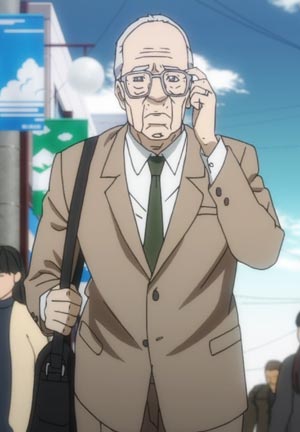
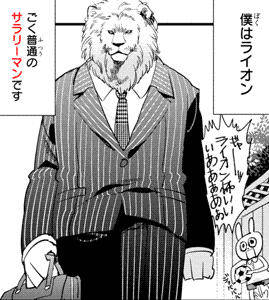
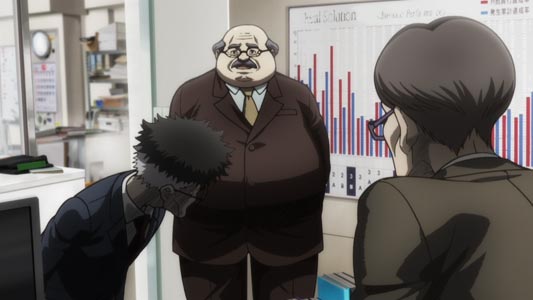



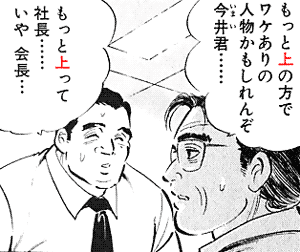
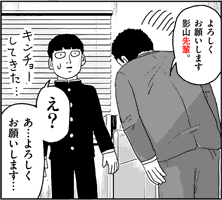

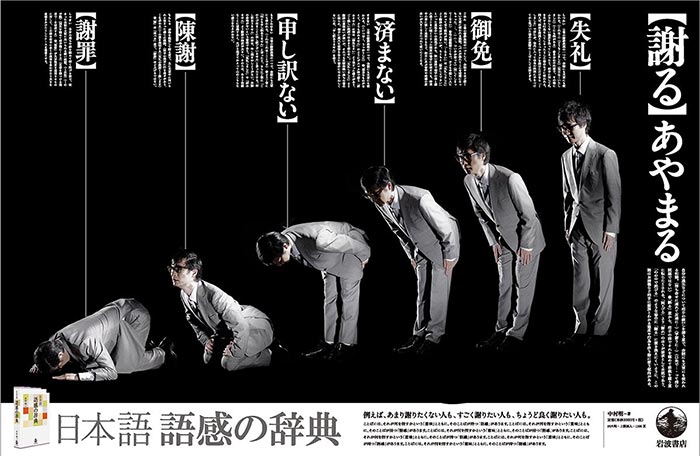
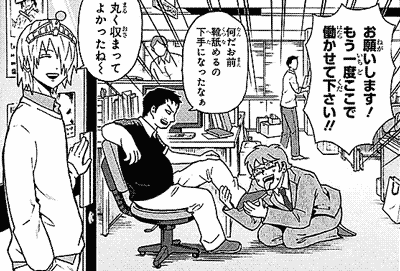
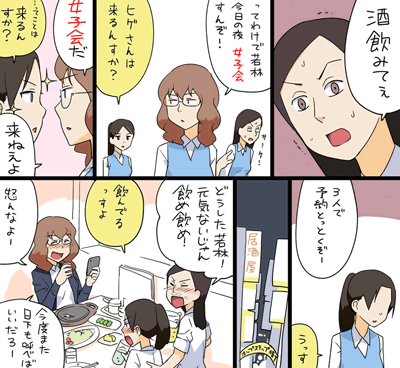

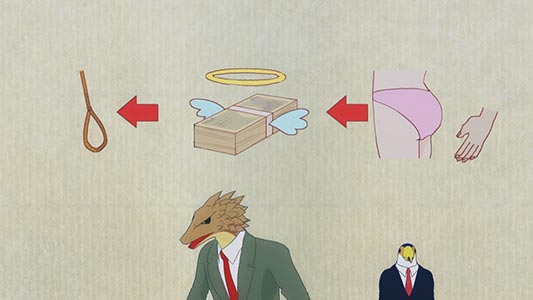
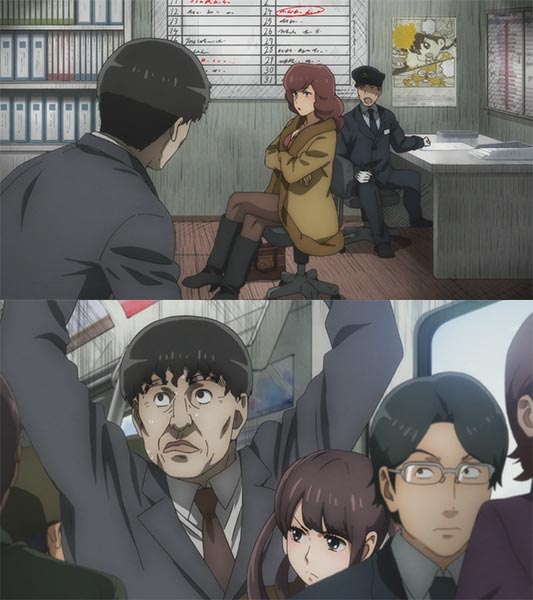
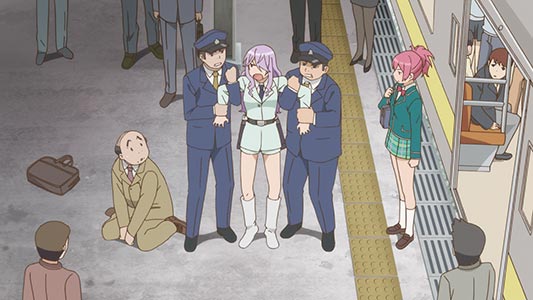
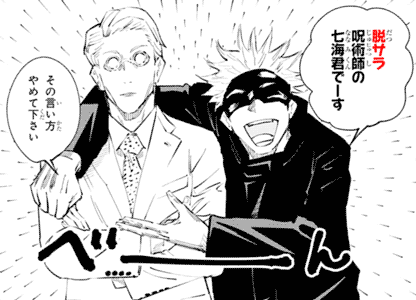

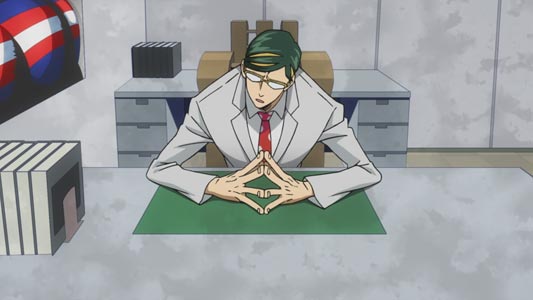
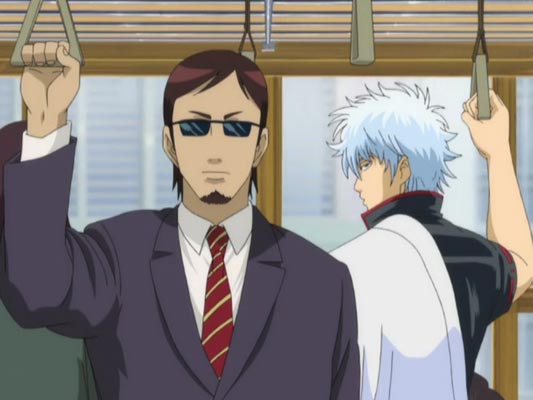
This is a fantastic and thoroughly researched piece, I applaud all those involved!!
ReplyDelete